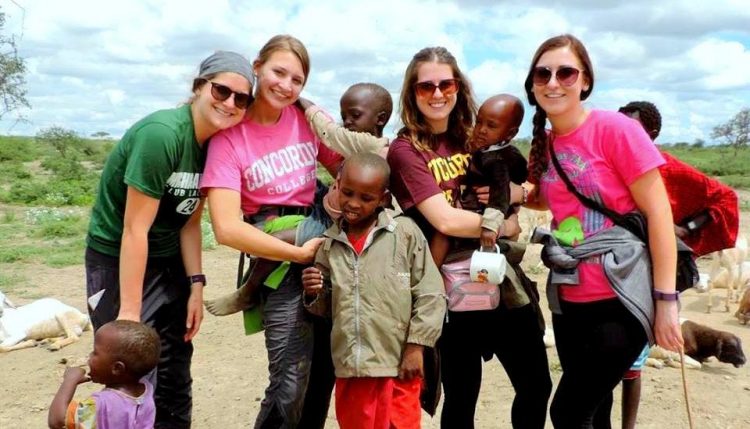
-
Table of Contents
“Volunteer Tourism: Empowering Travelers to Make a Positive Impact”
Introduction
Volunteer tourism, also known as voluntourism, is a form of travel that involves individuals actively participating in sustainable development projects while exploring new destinations. It combines the desire to explore different cultures and places with the opportunity to make a positive impact on local communities and the environment. Volunteer tourism programs typically focus on areas such as education, healthcare, environmental conservation, and community development. By engaging travelers in these projects, volunteer tourism aims to foster cross-cultural understanding, promote sustainable practices, and contribute to the overall well-being of the destinations visited.
The Impact of Volunteer Tourism on Local Communities
Volunteer tourism, also known as voluntourism, is a growing trend in the travel industry. It involves travelers participating in sustainable development projects while exploring new destinations. This form of tourism aims to make a positive impact on local communities by addressing their needs and contributing to their development. In this section, we will explore the impact of volunteer tourism on local communities.
One of the key benefits of volunteer tourism is the direct impact it has on local communities. By engaging in projects such as building schools, providing healthcare services, or conserving natural resources, volunteers contribute to the development of the community. These projects often address pressing issues that the community faces, such as lack of infrastructure or access to basic services. The involvement of volunteers brings much-needed resources and expertise to these projects, helping to improve the quality of life for local residents.
Furthermore, volunteer tourism fosters cultural exchange and understanding between travelers and local communities. As volunteers work alongside community members, they have the opportunity to learn about their customs, traditions, and way of life. This cultural immersion allows for a deeper appreciation and understanding of the local culture, breaking down stereotypes and promoting mutual respect. In turn, local communities benefit from the exposure to different perspectives and ideas brought by volunteers, enriching their own cultural heritage.
Another significant impact of volunteer tourism is the economic boost it provides to local communities. When travelers engage in volunteer projects, they often spend money on accommodation, food, transportation, and other goods and services provided by local businesses. This injection of tourism revenue helps to stimulate the local economy, creating job opportunities and supporting small-scale enterprises. Additionally, volunteer tourism can help diversify the local economy by promoting sustainable practices such as eco-tourism or handicraft production, which can generate income for the community in the long term.
However, it is important to acknowledge that volunteer tourism is not without its challenges. One of the main concerns is the potential for dependency on volunteers. If local communities become reliant on the presence of volunteers to address their needs, it can hinder their ability to develop sustainable solutions on their own. To mitigate this risk, it is crucial for volunteer tourism organizations to work in collaboration with local stakeholders, ensuring that projects are community-driven and that capacity-building initiatives are in place.
Additionally, there is a need for responsible and ethical volunteer tourism practices. It is essential for volunteers to be adequately trained and prepared for their projects, ensuring that they have the necessary skills and knowledge to make a meaningful contribution. Furthermore, volunteers should be mindful of the cultural sensitivities and social dynamics of the community they are working with, respecting their customs and traditions. This requires a commitment to cultural sensitivity and responsible behavior from both volunteers and the organizations facilitating volunteer tourism experiences.
In conclusion, volunteer tourism has a significant impact on local communities. It provides direct support to development projects, fosters cultural exchange, and stimulates the local economy. However, it is important to approach volunteer tourism with a responsible and ethical mindset, ensuring that projects are community-driven and that volunteers are adequately prepared. By doing so, volunteer tourism can continue to be a powerful tool for sustainable development and positive change in local communities.
How Volunteer Tourism Promotes Cultural Exchange and Understanding
Volunteer tourism, also known as voluntourism, is a growing trend in the travel industry that combines the desire to explore new destinations with the opportunity to make a positive impact on local communities. This form of travel allows individuals to engage in sustainable development projects while immersing themselves in the local culture. One of the key benefits of volunteer tourism is its ability to promote cultural exchange and understanding.
When travelers participate in volunteer tourism, they have the unique opportunity to interact with local communities in a meaningful way. Unlike traditional tourism, where interactions with locals may be limited to brief encounters, volunteer tourism allows travelers to work alongside community members on various projects. This hands-on experience fosters a deeper understanding of the local culture, traditions, and way of life.
By actively engaging with locals, volunteers can learn about their customs, language, and traditions. This cultural exchange goes beyond surface-level interactions and allows for a more authentic and immersive experience. Volunteers often find themselves forming genuine connections with community members, forging friendships that can last a lifetime. These personal connections not only enrich the volunteer’s experience but also contribute to a greater understanding and appreciation of different cultures.
Furthermore, volunteer tourism promotes cultural understanding by breaking down stereotypes and challenging preconceived notions. Through direct engagement with locals, volunteers can dispel misconceptions and gain a more nuanced understanding of the community they are working with. This firsthand experience helps to bridge cultural gaps and foster empathy and respect for different ways of life.
In addition to promoting cultural exchange, volunteer tourism also encourages travelers to become more culturally sensitive. Volunteers are often required to adapt to local customs and traditions, which helps them develop a greater appreciation for cultural diversity. This heightened awareness of cultural differences can have a lasting impact on volunteers, influencing their behavior and attitudes even after they return home.
Moreover, volunteer tourism projects are often designed in collaboration with local communities, ensuring that they align with their needs and priorities. This participatory approach empowers local communities and allows them to share their knowledge and expertise with volunteers. By involving locals in the planning and implementation of projects, volunteer tourism fosters a sense of ownership and pride within the community. This collaborative effort not only promotes cultural exchange but also ensures that projects are sustainable and have a lasting impact.
In conclusion, volunteer tourism offers a unique opportunity for travelers to engage in sustainable development projects while promoting cultural exchange and understanding. By actively participating in local communities, volunteers can learn about different cultures, challenge stereotypes, and develop a greater appreciation for cultural diversity. Through their interactions with locals, volunteers forge personal connections and form lasting friendships. Moreover, the participatory nature of volunteer tourism projects ensures that they are aligned with the needs and priorities of local communities, fostering a sense of ownership and empowerment. As the popularity of volunteer tourism continues to grow, it is clear that this form of travel has the potential to make a significant positive impact on both travelers and the communities they visit.
The Role of Volunteer Tourism in Environmental Conservation
Volunteer tourism, also known as voluntourism, is a growing trend in the travel industry that combines the desire to explore new destinations with the opportunity to make a positive impact on local communities and the environment. In recent years, there has been a significant increase in the number of travelers who are seeking meaningful experiences and are willing to dedicate their time and skills to sustainable development projects.
One area where volunteer tourism has played a crucial role is in environmental conservation. With the increasing awareness of the urgent need to protect our planet, many travelers are now choosing to participate in projects that focus on preserving and restoring natural habitats, conserving wildlife, and promoting sustainable practices.
One of the key benefits of volunteer tourism in environmental conservation is the hands-on experience it provides. Unlike traditional tourism, where travelers are mere spectators, volunteer tourists actively engage in activities that contribute to the preservation of the environment. Whether it’s planting trees, cleaning up beaches, or monitoring wildlife populations, these individuals become an integral part of the conservation efforts, gaining a deeper understanding of the challenges faced and the importance of their contribution.
Furthermore, volunteer tourism in environmental conservation projects often involves collaboration with local communities. This aspect is crucial as it ensures that the projects are sustainable and have a long-lasting impact. By working closely with local residents, volunteers not only contribute to the conservation efforts but also empower the community to take ownership of their natural resources. This collaboration fosters a sense of responsibility and encourages the adoption of sustainable practices beyond the duration of the volunteer program.
Another significant role of volunteer tourism in environmental conservation is the education and awareness it generates. Many volunteer programs include educational components that aim to raise awareness about environmental issues and promote sustainable behaviors. By interacting with local communities and sharing their experiences, volunteers become ambassadors for environmental conservation, inspiring others to take action and make a difference in their own lives.
Moreover, volunteer tourism in environmental conservation projects often leads to the creation of networks and partnerships between different stakeholders. These collaborations can range from local NGOs and government agencies to international organizations and academic institutions. By bringing together individuals and organizations with a shared goal, volunteer tourism facilitates the exchange of knowledge, resources, and best practices, ultimately enhancing the effectiveness of conservation efforts.
However, it is important to acknowledge that volunteer tourism in environmental conservation is not without its challenges. The potential for negative impacts, such as unintentional harm to ecosystems or disruption of local communities, should be carefully managed. It is crucial for volunteer programs to have clear guidelines and protocols in place to ensure that the activities are conducted in a responsible and sustainable manner.
In conclusion, volunteer tourism plays a vital role in environmental conservation by providing hands-on experience, fostering collaboration with local communities, generating awareness, and facilitating partnerships. By engaging travelers in sustainable development projects, volunteer tourism not only contributes to the preservation of our planet but also empowers individuals to become agents of change. As the demand for meaningful travel experiences continues to grow, it is essential for the travel industry to embrace and support volunteer tourism as a powerful tool for sustainable development.
Conclusion
In conclusion, volunteer tourism is a form of travel that engages individuals in sustainable development projects. It allows travelers to contribute their time and skills to local communities, while also gaining a deeper understanding of different cultures and social issues. Volunteer tourism has the potential to create positive impacts by addressing community needs, promoting environmental conservation, and fostering cross-cultural exchange. However, it is important to ensure that volunteer tourism is conducted ethically and responsibly, with a focus on long-term sustainability and the empowerment of local communities.




